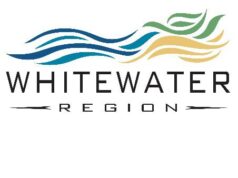by CONNIE TABBERT
Editor
WHITEWATER REGION (Cobden) — Whitewater Region council is pro-economic development and recently approved two projects geared to economic improvement.
Community Improvement Plan
The first it agreed to is to proceed with Phase One of the Community Improvement Plan (CIP) process, which will include consultations with township residents and businesses. It also agreed to designate all the villages and hamlets – Beachburg, Cobden, Westmeath, La Passe, Foresters Falls and Haley Station — as the Community Improvement Project Area Phase One.
Intern student Robert Tran explained to council the plan he has been working on at a recent council meeting.
“A Community Improvement Plan is a document that provides municipalities with tools and strategies that allow for the improvement, rehabilitation or redevelopment of defined project areas,” he said.
CIPs provide planning and financing of development activities that effectively use, reuse and restore lands, buildings and infrastructure, he said.
The Community Improvement Project Area (CIPA) is an area within a municipality that has been identified that it needs to be improved due to age, dilapidation or the unsuitability of buildings, Mr. Tran said.
He noted there are three stages for the CIP process. The first is the community vision; the second is building the foundation and the final stage is getting started.
There are municipal and provincial legislation and policies that must be followed, such as the County of Renfrew Official Plan, the Planning Act, the Provincial Policy Statement and the Municipal Act, he said.
There are at least nine programs identified by Mr. Tran that could provide funding for Whitewater Region, including Façade and Property Improvement Grant/Loan; Heritage Property Improvement Program; Accessibility Improvement Program; Signage Improvement Grant Program and Landscaping and Public Art Program.
Mr. Tran noted that the current county official plan does not allow the municipality to implement some of the programs in Phase 2.
However, Chief Administrative Officer Robert Tremblay said Mr. Tran was able to find a way to proceed with the CIP in a traditional sense in the villages and hamlets, and that’s why the whole township is not included in the CIPA.
“This will allow us, while we have Robert with us, to get Phase One done and get out and talk to the businesses and residents and look at programs in hamlets and villages,” CAO Tremblay said.
“By passing this (resolution), it allows us to move forward, have the first bylaw identify the study area and once the consultations are completed, Robert will come back with a follow-up report.”
Staff would then be able to consult with the county on policy framework to allow some incentives to be done, such as improving facades, signage and other things in the hamlets and villages, CAO Tremblay explained.
First Impressions Community Exchange
Intern student Ethan Robert spoke about various programs he is working on regarding economic development within the township. In early June, he spoke about five projects he believes would be good for the municipality: working on ongoing projects, such as the community profile; participating in the First Impressions Community Exchange (FICE) program; the business improvement area; business retention and expansion and a networking function.
At the June 21 council meeting, he asked, and received approval, to participate in FICE.
FICE is a program offered through the Ontario Ministry of Agriculture and Rural Affairs, he said. The municipality would partner with a community that is similar to Whitewater Region and exchange visits and report on first impressions of things, such as signage, community services, entrances and exits, services offered, etc.
“It’s a good way to start to find out what we need to improve on, what we are doing well, and provide an opportunity to improve,” Mr. Robert said.
He noted the benefits associated with the FICE are sourcing new ideas to improve competitiveness; identifying a community’s strengths, weakness and opportunities; support a strategic or community action plan; and foster community linkages.
There are four steps to FICE, he said. They are preparation; exchange; report back and action plans; and then implement and monitor.
Mr. Robert provided several FICE exchanges that occurred across Ontario as well as an exchange report. He said the costs for the program would be dependent on the distance of the partner community. He said the average cost for a FICE assessment is approximately $500.
Once council approved participating in FICE, a review team would be identified and he would contact the OMAFRA representative and begin the exchange.
Mayor Hal Johnson said, “This is a great way to one, get ideas when you go to other communities and two, nothing is seen clearer than the eye from somewhere else.
“I think it’s a great program.”






![Kenopic/Smith Auction [Paid Ad]](https://whitewaternews.ca/wp-content/uploads/2018/10/advertising-100x75.jpeg)

